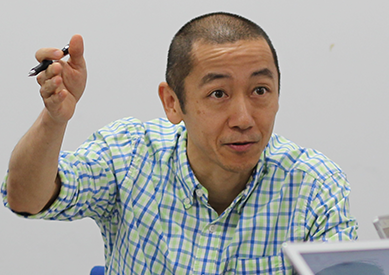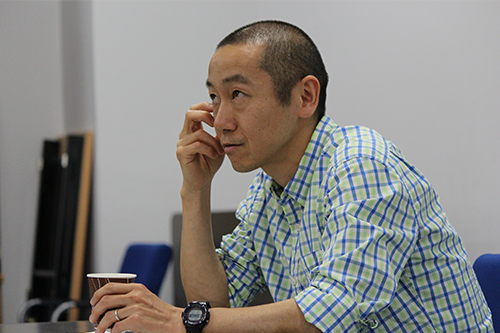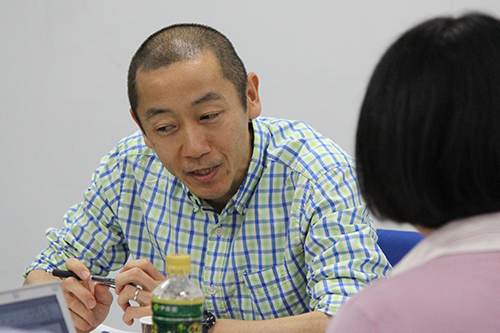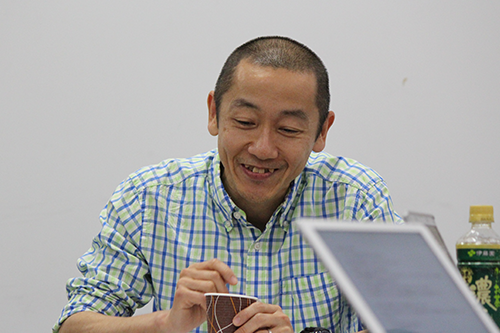TopicsTeacher Interview

Making Courses More Open
Professor Ryo Yamada, Graduate School of Medicine, Kyoto University
Professor Yamada is the instructor of a MOOC called "005x: Introduction to Statistical Methods for Gene Mapping," which makes use of statistical genetics. With distribution scheduled to begin in February 2016, he took part in preparations for the course for about half a year and was also involved in administering the course for about one month. After the course period ended, we heard from Professor Yamada regarding his feelings about actually creating and administering a MOOC.
What is Possible when Using a MOOC System in Graduate Education?
First of all, I'd like to hear a frank account about what you felt when you were asked to create a MOOC. At that time, did you even know that MOOCs existed?

Up to that point, I knew through an information bulletin released within Kyoto University and other media that the university had begun to participate in a massive open online courses project. When I received the request to participate as part of the Top Global University Project, I thought it might be hard, but since I made use of the Web for practical work in my regular courses, I didn't think it would be very tedious work. I was interested in the question of what it would be like to take the type of graduate teaching I had been doing and offer it to large numbers of people over the system.
Now that you have created a MOOC, is there any difference between a regular class and a MOOC?
Since it is different from a regular class, there was a lot of extra work to be done. In a regular class, I usually talk while interacting with students, so I was unaccustomed to a format in which I do all the talking. At first, it was difficult to guess the relation between how much content I would talk about and how long that content would be in the format. If I had understood more ahead of time about making videos and how to divide up the content, I could have created the course more efficiently.
Yet, in the middle of my preparations, I began to think that creating the content I offered by moving forward at my own pace was better than feeling pressured to keep up with producing the MOOC. For all that, I made a point of not causing trouble for the production team.
Previously, you have said that you use the Web in your regular lectures. In what way do you use it?
Essentially, I have all the students bring their computers to class, and I use various things that are possible with them. One example is writing the source code for a program and sharing it with other students. Another thing I often do is have them upload assigned reports to the Web so that the students can see one another's reports and can help one another study.
I Think That in the Best Sense, Participants Who Were Suited for the Content of the Course Continued to the End.
When the MOOC lecture began, students interacted with one another on the discussion forum, and the TAs enthusiastically answered their questions. What impression did you have when you saw that?

Since I left the job of dealing with the discussion forum to my TAs, I don't know all the specifics of their interactions. I just had the TAs consult me about questions that they had difficulty answering. Judging from what I saw of the nature of the questions that came up, I got the feeling that there weren't a lot of extremely capable students taking the course, but there also weren't any students who were completely incapable. I told the TAs that it would be great if there was something they could answer in careful details, but if their careful explanation didn't work, it was OK to tell the student, "The very fact that you don't understand it shows that you have a challenge to address." I did my best not to stray from the subject during my lectures. Judging from what I saw from the students' academic records, I think that in the best sense, people who were suited for the content of the course continue to persist.
I Would Like Students to Make Use of MOOCs As Preparatoly Learning Materials.
Are you thinking of using MOOCs in your regular classes in the future?

I wish I could substitute a MOOC for part of the course and make it a self-study assignment for times when I was away.*1 In addition, I might consider using it with students who have not studied the necessary prerequisites. They could take part of a MOOC before taking the course. Since graduate school is the final opportunity for higher education, I do not want to lower the level required of the students. There are some things that must be learned cumulatively, and no matter how different your specialty background is, you sometimes need the course-specific knowledge. I'd like it if people challenged themselves in taking the course after having that knowledge since there are all kinds of educational materials available in all kinds of places, not just MOOCs, and it would be possible if people took some time to do so.
Is there anything you would like to add to the MOOC you created this year when you offer it again?
There are no particular changes I would like to make in the four weeks that are currently available, but each week's content is independent of the others to a certain extent. Therefore, I wonder if it could be possible to take each week separately as necessary.
When the only place in the world where one can study the topic of Statistical Genetics is opened to the outside world, it is very useful for the people who want to study it, isn't it?
Studying the content of this course from a book is really tough, but since we can offer all at once videos and images as well as the materials required to learn programming, students can learn in a more practical way. Even if we cannot follow up with students as necessary by answering their questions and such, just as we did this time, it may be a good idea to keep the learning content open at all times.
Questions asked by: Masako Okamoto, Hiroyuki Sakai, Mana Taguchi, and Yoshimi Kozai
Article composition: Takeo Suzuki and Motoko Okumoto
Interview date: May 13, 2016
Published online: August 23, 2017 (Original article)
May 7, 2018 (English article)
*1 In Article 25 of its ordinance Standards for Establishment of Universities, the Ministry of Education, Culture, Sports, Science, and Technology acknowledges the use of various media, as described below, for conducting classes.
Article 25-2
A university may have its students take classes as set forth in the preceding paragraph at places other than a classroom where said classes are conducted by using various types of media in a highly advanced manner, as specified separately by the Minister of Education, Culture, Sports, Science and Technology.
A requirement for such classes is that they be either simultaneous and interactive or use the Internet or other such appropriate methods that allow students' responses to homework and test questions, correction and advice, instructors' responses to questions by students, and other sufficient guidance. Furthermore, students should be guaranteed opportunities to exchange opinions with one another.
Click here to get more information on KyotoUx.


